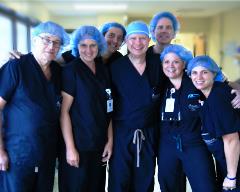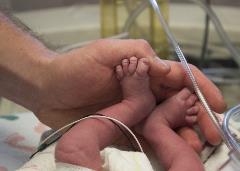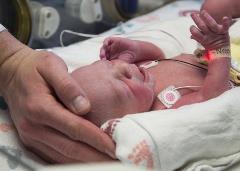The First U.S. Birth after Uterine Transplantation
 Abdominal organ transplantation seemed straight forward until Uterus Transplant came to light. Liver, kidney, pancreas, intestine transplants share many similarities. First, the patients are all very ill, and for some of them it is a matter of only days or a few weeks, unless an organ is transplanted. Uterus Transplant is not lifesaving. I am not even sure it can be called life enhancing if one adds up the 3 surgeries needed (the transplant itself, the C-section and the graft hysterectomy), the need for immunosuppression, the cervical biopsies to monitor for rejection, and the actual pregnancy. A woman who undergoes a uterus transplant is young and not ill, and yet willingly becomes a patient when other alternatives to have a child exist which carry less risk and effort.
Abdominal organ transplantation seemed straight forward until Uterus Transplant came to light. Liver, kidney, pancreas, intestine transplants share many similarities. First, the patients are all very ill, and for some of them it is a matter of only days or a few weeks, unless an organ is transplanted. Uterus Transplant is not lifesaving. I am not even sure it can be called life enhancing if one adds up the 3 surgeries needed (the transplant itself, the C-section and the graft hysterectomy), the need for immunosuppression, the cervical biopsies to monitor for rejection, and the actual pregnancy. A woman who undergoes a uterus transplant is young and not ill, and yet willingly becomes a patient when other alternatives to have a child exist which carry less risk and effort.
 Second, the adrenalin rush of the transplant itself is immediately mitigated by the coming to life of the organ once the vascular clamps are removed. Whether it is urine or bile or normoglycemia there is an almost immediate proof that what we have connected is working. The uterus instead is elusive. It does not give any immediate satisfaction. It makes the surgeon agonize and not only once. It makes you wait for the first period, then it makes you pray for the success of the embryo transfer. Then it puts you through a pregnancy where each month seems to last 270 days. If someone wanted to teach a transplant surgeon a lesson about delayed gratification, uterus transplant manages to do it in the most painful way.
Second, the adrenalin rush of the transplant itself is immediately mitigated by the coming to life of the organ once the vascular clamps are removed. Whether it is urine or bile or normoglycemia there is an almost immediate proof that what we have connected is working. The uterus instead is elusive. It does not give any immediate satisfaction. It makes the surgeon agonize and not only once. It makes you wait for the first period, then it makes you pray for the success of the embryo transfer. Then it puts you through a pregnancy where each month seems to last 270 days. If someone wanted to teach a transplant surgeon a lesson about delayed gratification, uterus transplant manages to do it in the most painful way.
 And lastly, the irony of it all, when all goes well in surgery all efforts are directed at making that liver, kidney or pancreas last as long as possible. We are even judged and ranked according to our transplant outcomes. For uterus transplant, longevity is a relative issue. The uterus has exhausted its function, for the donor, when it is taken and will then live on in the recipient just long enough to resume its function again before finally being discarded. Which leads me to think about the uterus living donors, they are amazing human beings like all other living organ donors. The women who donated their uterus are not donating a piece of themselves to help a fellow human being to live longer. They are going through the severity of surgery to donate an experience, the unique experience of going through pregnancy and giving birth. So many things seem to take a different connotation and open new chapters in transplantation when uterus transplantation became reality.
And lastly, the irony of it all, when all goes well in surgery all efforts are directed at making that liver, kidney or pancreas last as long as possible. We are even judged and ranked according to our transplant outcomes. For uterus transplant, longevity is a relative issue. The uterus has exhausted its function, for the donor, when it is taken and will then live on in the recipient just long enough to resume its function again before finally being discarded. Which leads me to think about the uterus living donors, they are amazing human beings like all other living organ donors. The women who donated their uterus are not donating a piece of themselves to help a fellow human being to live longer. They are going through the severity of surgery to donate an experience, the unique experience of going through pregnancy and giving birth. So many things seem to take a different connotation and open new chapters in transplantation when uterus transplantation became reality.
 After years of taking care of people whose only alternative is a transplant and whose determination to live justifies it all, I am struck by these women whose determination it is to give life at the risk of their own health. I pause thinking about these two extremes, fighting for one’s own life and for giving life. The ethical, social and financial questions that arise carry with them a debate that does not find any conciliation until the baby is born. Then for that magical moment I find that as transplant surgeon I have contributed to a joy that is timeless, ancestral and most natural.
After years of taking care of people whose only alternative is a transplant and whose determination to live justifies it all, I am struck by these women whose determination it is to give life at the risk of their own health. I pause thinking about these two extremes, fighting for one’s own life and for giving life. The ethical, social and financial questions that arise carry with them a debate that does not find any conciliation until the baby is born. Then for that magical moment I find that as transplant surgeon I have contributed to a joy that is timeless, ancestral and most natural.
 Let’s enjoy these rare moments in medicine and transplantation especially when all we have learned through countless attempts and heroic efforts, both ours and the ones of the patients who trusted us, culminate in the indescribable joy of a newborn cry.
Let’s enjoy these rare moments in medicine and transplantation especially when all we have learned through countless attempts and heroic efforts, both ours and the ones of the patients who trusted us, culminate in the indescribable joy of a newborn cry.